Generative AI (GenAI) can be a powerful tool for brands at every stage of the customer life cycle. The ever-evolving technology has the potential to provide a more customized and beneficial customer experience (CX), improve employee productivity, and boost sales and revenues for businesses.
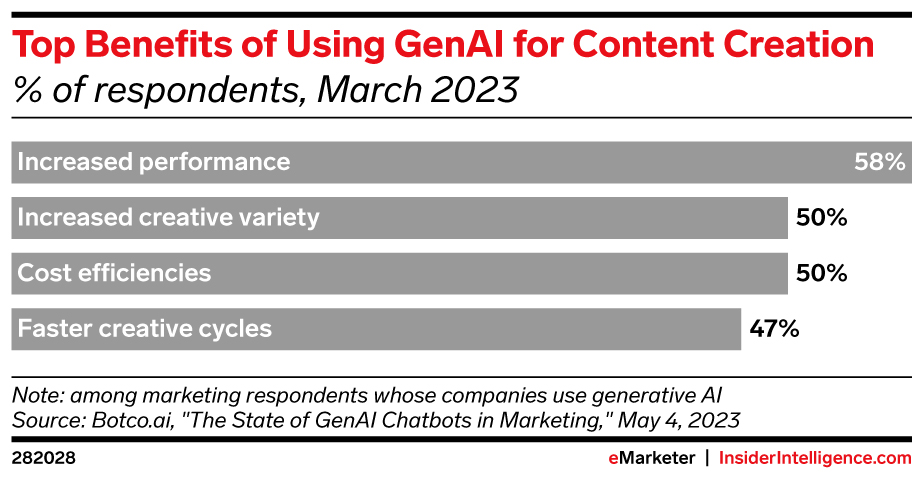
 Key Takeaways
Key Takeaways
![]() GenAI is making an impressive impact on the customer life cycle.
GenAI is making an impressive impact on the customer life cycle.
![]() GenAI is changing the buyer’s life cycle, both customer facing and behind the scenes by boosting brand awareness, increasing engagement, accelerating conversion rates, improving retention rates, and turning satisfied customers into brand advocates.
GenAI is changing the buyer’s life cycle, both customer facing and behind the scenes by boosting brand awareness, increasing engagement, accelerating conversion rates, improving retention rates, and turning satisfied customers into brand advocates.
GenAI is making an impressive impact on the customer life cycle.
GenAI is providing numerous benefits across the entire CX. Accelerated by the recent releases of Midjourney, DALL-E 2, and ChatGPT, a revolutionary transformation is underway for marketers regarding the way they engage and interact with consumers.
 GenAI is reshaping the buyer’s journey.
GenAI is reshaping the buyer’s journey.
GenAI tools, frequently in combination with other AI or machine learning (ML) technology, are now used at every stage of the customer life cycle—awareness, consideration, purchase, retention, and advocacy—to enhance and improve the overall experience.
 Marketers are embracing GenAI.
Marketers are embracing GenAI.
Recent breakthroughs have the potential to drastically change the way the industry approaches content creation. Among GenAI features US brand marketers appreciate most is its ability to improve market research and content creation, per a March 2023 Sitecore survey.
 Investing in GenAI pays.
Investing in GenAI pays.
GenAI can help brands achieve significant time and cost savings. Two-thirds (66%) of marketers using GenAI reported a positive ROI, and many reported an increase in cost efficiencies and performance as well as faster creative cycles, per March 2023 data from Botco.ai.
 The benefits of GenAI continue to grow.
The benefits of GenAI continue to grow.
Some GenAI applications are well established with marketers, and some are brand-new experiments. But already, ChatGPT is the most popular form of GenAI: 55% of Botco.ai survey respondents use the tool to bolster performance and efficiencies while delivering better, more seamless experiences that resonate with their customers.
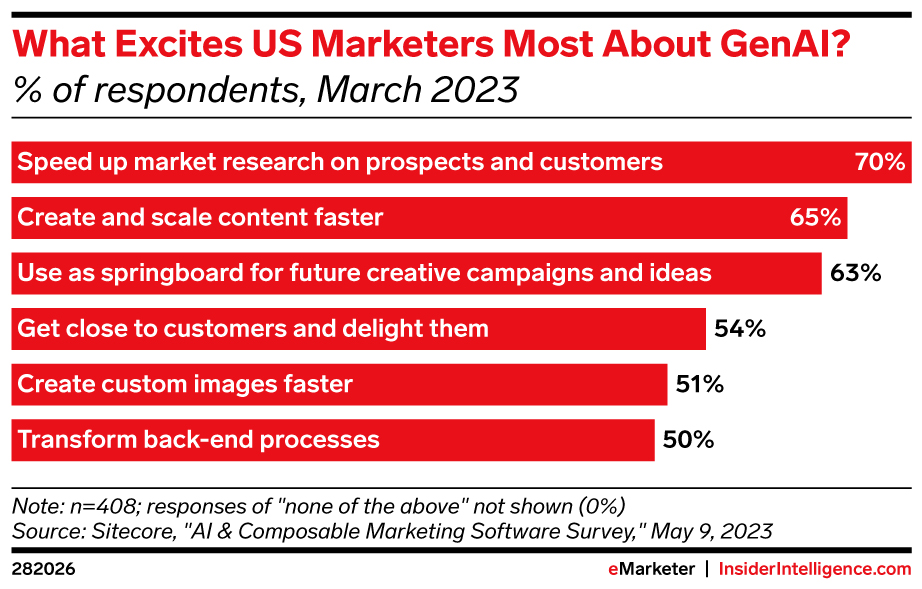
Here’s how GenAI is changing the buyer’s life cycle, both customer facing and behind the scenes, plus a look at case studies at each stage:
 Boost brand awareness
Boost brand awareness
From the very beginning of the buyer’s journey, GenAI can help attract potential customers by creating personalized content and responding in real time to a particular pain point, problem, or desire.
Customer facing:
![]() Provide social media advertisements with eye-catching images and video ads that evoke specific emotions. These ads can have more detailed, engaging storylines than traditional ad creation methods and can build a faster connection between the brand and the future buyer.
Provide social media advertisements with eye-catching images and video ads that evoke specific emotions. These ads can have more detailed, engaging storylines than traditional ad creation methods and can build a faster connection between the brand and the future buyer.
![]() Offer hyper-personalized content with specific language, terms, and phrases that resonate with potential customers. Using GenAI can enable brands to proactively stand out from the competition before a buyer has even begun to compare different brands.
Offer hyper-personalized content with specific language, terms, and phrases that resonate with potential customers. Using GenAI can enable brands to proactively stand out from the competition before a buyer has even begun to compare different brands.
Behind the scenes:
![]() Help brainstorm and develop themes and subjects. Create marketing collateral and support content marketing activities and plans for digital and content marketing campaigns.
Help brainstorm and develop themes and subjects. Create marketing collateral and support content marketing activities and plans for digital and content marketing campaigns.
![]() Identify new customer segments based on select criteria. Personalize marketing efforts and help brands establish themselves within these segments.
Identify new customer segments based on select criteria. Personalize marketing efforts and help brands establish themselves within these segments.
![]() Make quick content improvements, such as spotting gaps in the copy when comparing with a competitor’s content.
Make quick content improvements, such as spotting gaps in the copy when comparing with a competitor’s content.
![]() Generate millions of keywords based on criteria such as search volume, trends, or competitor content to help content rank high in search and drive traffic to a brand’s website.
Generate millions of keywords based on criteria such as search volume, trends, or competitor content to help content rank high in search and drive traffic to a brand’s website.
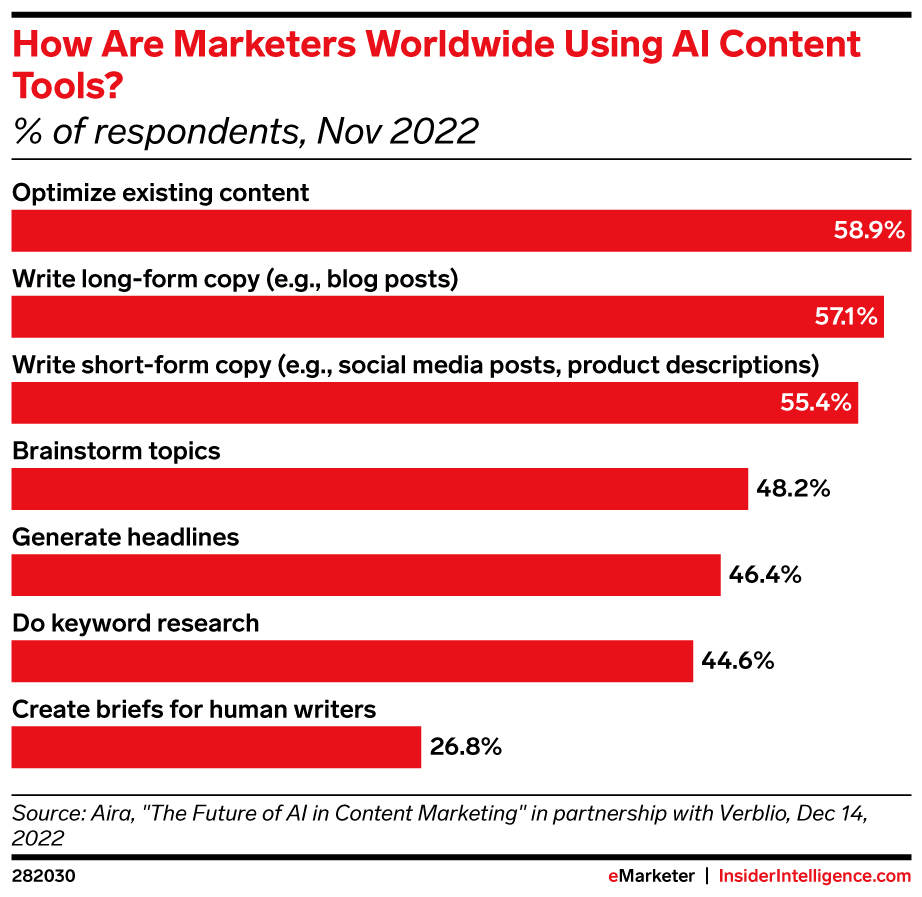
 Increase engagement
Increase engagement
GenAI can help buyers make better-informed decisions, increasing engagement and moving buyers closer to a purchase.
Customer facing:
![]() Provide product descriptions and information based on preference and consumption behavior. For example, show copy that emphasizes the sustainability features of a product for one buyer and technical details for another.
Provide product descriptions and information based on preference and consumption behavior. For example, show copy that emphasizes the sustainability features of a product for one buyer and technical details for another.
![]() Offer relevant product comparisons, customer reviews, and testimonials to help buyers evaluate their options. Deliver timely recommendations personalized to specific needs, budgets, and preferences. Create content that resonates with potential customers looking at similar brands.
Offer relevant product comparisons, customer reviews, and testimonials to help buyers evaluate their options. Deliver timely recommendations personalized to specific needs, budgets, and preferences. Create content that resonates with potential customers looking at similar brands.
Behind the scenes:
![]() Repurpose valuable content into a different format, such as creating a blog post from a white paper. Extract the most relevant and valuable information from the white paper—e.g., main concepts and quotes—and change the tone to match the new format.
Repurpose valuable content into a different format, such as creating a blog post from a white paper. Extract the most relevant and valuable information from the white paper—e.g., main concepts and quotes—and change the tone to match the new format.
![]() Create better email copy and images for retargeting display ads. More than 40% of marketers use GenAI to create email copy, according to Botco.ai. Additionally, AI-generated subject lines had a 68% better click rate than human-generated variants, translating to a potential incremental revenue opportunity of $5.8 million, per a December 2022 study by Persado.
Create better email copy and images for retargeting display ads. More than 40% of marketers use GenAI to create email copy, according to Botco.ai. Additionally, AI-generated subject lines had a 68% better click rate than human-generated variants, translating to a potential incremental revenue opportunity of $5.8 million, per a December 2022 study by Persado.
![]() Understand a buyer’s language and expectations based on how they write in chatbot conversations. Rephrase or rewrite responses specific to that buyer in their tone of voice.
Understand a buyer’s language and expectations based on how they write in chatbot conversations. Rephrase or rewrite responses specific to that buyer in their tone of voice.
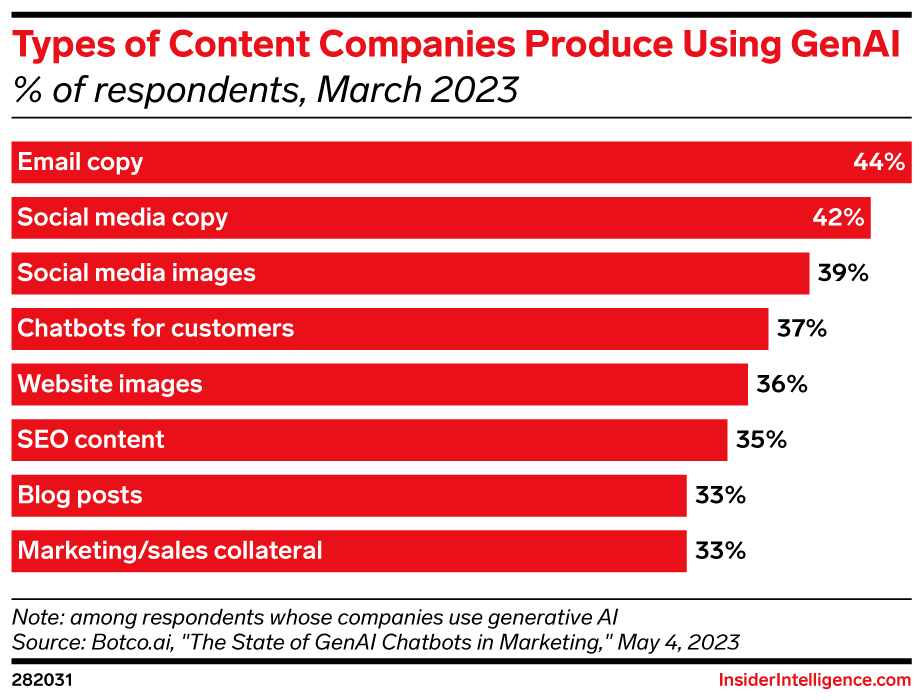
 Accelerate conversion rates
Accelerate conversion rates
GenAI can personalize and quicken the decision-making process for buyers looking to make a purchase, leading to higher conversion rates for brands.
Customer facing:
![]() Identify products most likely to be of interest and deliver targeted recommendations tailored to the buyer’s preferences. Provide real-time support and guidance.
Identify products most likely to be of interest and deliver targeted recommendations tailored to the buyer’s preferences. Provide real-time support and guidance.
![]() Offer pricing and promotional products most likely to be in the buyer’s budget. Provide information about shipping options, payment methods, and order status.
Offer pricing and promotional products most likely to be in the buyer’s budget. Provide information about shipping options, payment methods, and order status.
Behind the scenes:
![]() Assist sales associates by providing real-time insights and suggestions during customer interactions, helping them better understand the customer’s needs and preferences.
Assist sales associates by providing real-time insights and suggestions during customer interactions, helping them better understand the customer’s needs and preferences.
![]() Help brands follow up with messaging to customers who have abandoned their shopping carts. Offer personalized discounts and promotions, and provide recommendations for related products.
Help brands follow up with messaging to customers who have abandoned their shopping carts. Offer personalized discounts and promotions, and provide recommendations for related products.
 Improve retention rates
Improve retention rates
GenAI can help foster customer satisfaction and move customers to the advocacy stage.
Customer facing:
![]() Help resolve customer issues, in multiple languages, with faster and more accurate answers. Offer personalized assistance based on preferences, purchases, and past customer service interactions to improve resolution rates and reduce customer frustration.
Help resolve customer issues, in multiple languages, with faster and more accurate answers. Offer personalized assistance based on preferences, purchases, and past customer service interactions to improve resolution rates and reduce customer frustration.
![]() Offer additional products that complement an existing purchase, proactively increasing opportunities for cross-selling and upselling. Continually engage customers with relevant content and resources.
Offer additional products that complement an existing purchase, proactively increasing opportunities for cross-selling and upselling. Continually engage customers with relevant content and resources.
Behind the scenes:
![]() Scale customer support and assistance and reduce the workload of customer support representatives. Surface and rapidly resolve the most complex cases with “swarming,” a collaboration-based approach to resolutions rather than the traditional tiered escalation-based process.
Scale customer support and assistance and reduce the workload of customer support representatives. Surface and rapidly resolve the most complex cases with “swarming,” a collaboration-based approach to resolutions rather than the traditional tiered escalation-based process.
![]() Use a large language model (LLM) to summarize and simplify technical content or a complex topic that would otherwise be hard for customers to understand. This can make content easier to read or more palatable to a certain type of customer.
Use a large language model (LLM) to summarize and simplify technical content or a complex topic that would otherwise be hard for customers to understand. This can make content easier to read or more palatable to a certain type of customer.
![]() Train an LLM—like Meta’s LLaMA or GPT-NeoX-20B—that’s unique to the company’s domain-specific data and provide it to customers as a chat interface where they can get specific answers from the company’s knowledge base.
Train an LLM—like Meta’s LLaMA or GPT-NeoX-20B—that’s unique to the company’s domain-specific data and provide it to customers as a chat interface where they can get specific answers from the company’s knowledge base.
 Turn satisfied customers into brand advocates
Turn satisfied customers into brand advocates
GenAI can help build long-term loyalty, drive recurring revenue growth, and affordably turn loyal customers into advocates.
Customer facing:
![]() Encourage customers to provide positive reviews, share user-generated content, and offer engaging social media content that fosters brand loyalty. Deliver personalized experiences that exceed customer expectations.
Encourage customers to provide positive reviews, share user-generated content, and offer engaging social media content that fosters brand loyalty. Deliver personalized experiences that exceed customer expectations.
![]() Offer personalized referral incentives by skimming product reviews or customer service conversations. Identify and reward loyal customers who are likely to recommend their brand to friends and family.
Offer personalized referral incentives by skimming product reviews or customer service conversations. Identify and reward loyal customers who are likely to recommend their brand to friends and family.
![]() Foster a better connection. Three-quarters of marketers believe AI tools can help promote a stronger CX because of the ability to create personalized content, per Sitecore.
Foster a better connection. Three-quarters of marketers believe AI tools can help promote a stronger CX because of the ability to create personalized content, per Sitecore.
Behind the scenes:
![]() Capture and analyze chatbot conversations and sentiment patterns for continuous improvements. Immediately mitigate poor customer experiences with personalized solutions—a meal voucher via an apology email or text message after a delayed flight, for instance.
Capture and analyze chatbot conversations and sentiment patterns for continuous improvements. Immediately mitigate poor customer experiences with personalized solutions—a meal voucher via an apology email or text message after a delayed flight, for instance.
![]() Create text and video case studies and client testimonials. Automatically alert customer success teams about positive engagements via email and social media so they can reward these happy customers.
Create text and video case studies and client testimonials. Automatically alert customer success teams about positive engagements via email and social media so they can reward these happy customers.
![]() Positively influence the relationship with customers. Almost three-quarters of marketers said AI will bring them closer to their desired CX because it can help them more fully understand customer needs, per Sitecore.
Positively influence the relationship with customers. Almost three-quarters of marketers said AI will bring them closer to their desired CX because it can help them more fully understand customer needs, per Sitecore.
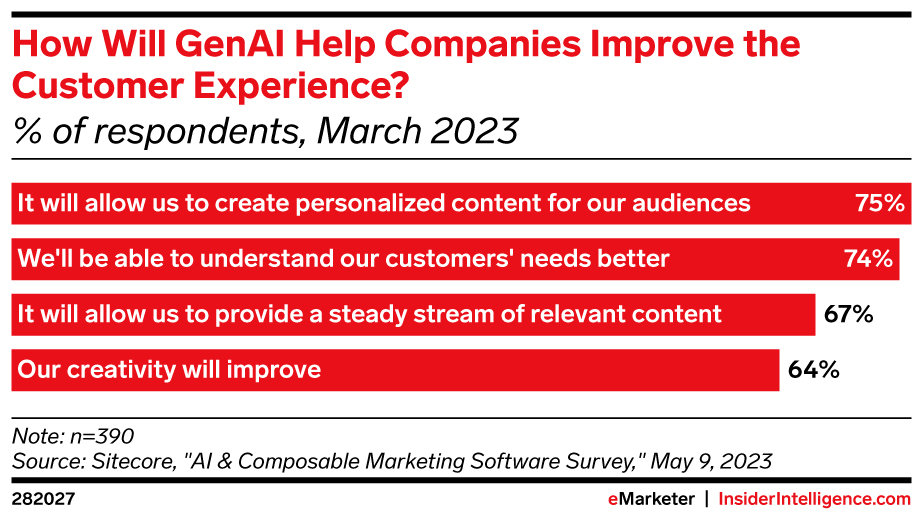
How can marketers and CX leaders capitalize on GenAI?
Change and adaptation are key as the technology rapidly evolves. To keep up, marketing and CX leaders should do the following:
 Keep business objectives in mind.
Keep business objectives in mind.
By monitoring and measuring how GenAI applications perform across the customer life cycle, brands can be sure to design experiences that meet the needs of customers and achieve business objectives and growth rates.
 Provide guidelines for human oversight.
Provide guidelines for human oversight.
GenAI still has a long way to go to ensure accuracy, attribution, and emotion. In customer support, GenAI outputs may not respond appropriately to complex situations, provide empathy, or incorporate specific domain knowledge.
 Foster a culture of innovation and invest in training.
Foster a culture of innovation and invest in training.
Encourage experimentation to help promote new GenAI applications. Help employees develop AI skills and knowledge, including effective prompts and context and data analysis techniques.
 Consider ethical implications and monitor the regulatory landscape.
Consider ethical implications and monitor the regulatory landscape.
Ensure data privacy and security concerns are addressed and that algorithms are developed to be unbiased. Ensure compliance with all relevant regulations and privacy laws.




 Key Takeaways
Key Takeaways